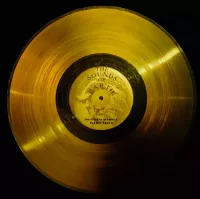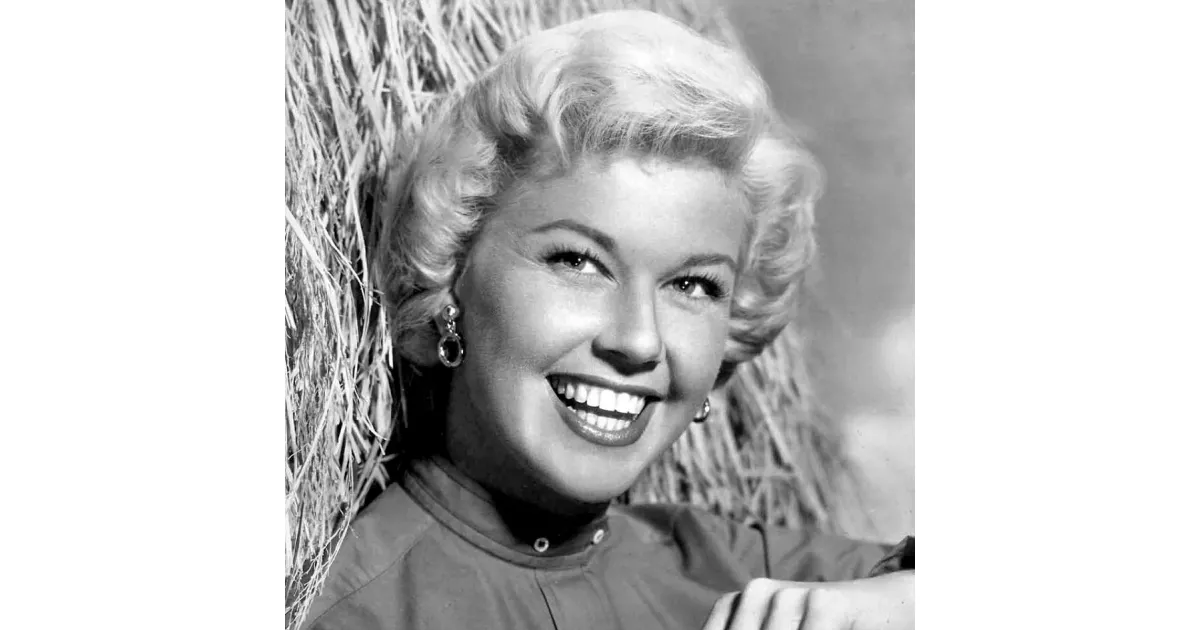Doris Day was a renowned American actress and singer. Her career began in 1937 as a big band singer, and she quickly rose to fame in 1945 with two number-one hits, "Sentimental Journey" and "My Dreams Are Getting Better All the Time," performed with Les Brown and His Band of Renown. Following this success, she transitioned to a solo career, recording over 650 songs between 1947 and 1967. Day also became a notable film actress, starring in a series of romantic comedies during the 1950s. These include Calamity Jane (1953), Pillow Talk (1959), and Move Over, Darling (1963). Her impressive and diverse career made her a beloved figure in American entertainment.
1915: Birth of Martin Melcher
Martin Melcher, Doris Day's third husband, was born in 1915.
1917: Birth of Al Jorden
Al Jorden, Doris Day's first husband, was born in 1917.
1917: Birth of Richard Kappelhoff
Doris Day's older brother, Richard, was born in 1917.
1919: Death of Richard and Birth of Paul Kappelhoff
Doris Day's brother Richard died and her brother Paul was born in 1919.
April 3, 1922: Birth of Doris Day
Doris Mary Anne Kappelhoff was born on April 3, 1922, in Cincinnati, Ohio.
1924: Incorrect Birth Year
For much of her life, Doris Day stated she was born in 1924, which was later corrected to 1922.
1926: Birth of George William Weidler
George William Weidler, Doris Day's second husband, was born in 1926.
1932: Parents' Separation
Doris Day's parents separated in 1932.
1935: Birth of Barry Comden
Barry Comden, Doris Day's fourth husband, was born in 1935.
October 13, 1937: Car Accident and Leg Injury
On October 13, 1937, Doris Day was in a car accident that resulted in a broken leg, impacting her dancing aspirations.
1937: Start of Music Career
Doris Day began her career as a big band singer in 1937.
1939: Stage Name Adoption
Doris Day adopted her stage name in 1939.
April 1941: Marriage to Al Jorden
Doris Day married trombonist Al Jorden in April 1941.
1941: Soundies Appearance
Doris Day appeared as a singer in three Soundies with the Les Brown band in 1941.
1942: Birth of Terrence Paul Jorden
Doris Day's son, Terrence Paul Jorden, was born in 1942.
February 1943: Divorce from Al Jorden
Doris Day divorced Al Jorden in February 1943.
1945: "Sentimental Journey" Release
Doris Day's hit recording "Sentimental Journey" was released in early 1945.
1945: Commercial Success as Singer
In 1945, Doris Day achieved commercial success with two No. 1 recordings, "Sentimental Journey" and "My Dreams Are Getting Better All the Time".
1945: Broadway Production of "The Glass Menagerie"
The Broadway production of "The Glass Menagerie", to which Day's performance in "Love Me or Leave Me" was compared, premiered in 1945.
March 30, 1946: Marriage to George William Weidler
Doris Day married George William Weidler on March 30, 1946.
1947: Start of Solo Recording Career
Doris Day embarked on a solo career and began recording in 1947.
1948: Casting in "Romance on the High Seas"
Doris Day was cast in "Romance on the High Seas" in 1948.
1948: Film Debut
Doris Day's film career began in 1948 with "Romance on the High Seas".
May 31, 1949: Divorce from George William Weidler
Doris Day divorced George William Weidler on May 31, 1949.
1949: "My Dream Is Yours" and "Someone Like You"
Doris Day recorded "Someone Like You" before the film "My Dream Is Yours", which featured the song, was released in 1949.
1949: Top Female Vocalist
From 1949 through 1958, Day was frequently ranked as the No. 1 female vocalist in Billboard's annual nationwide poll of disc jockeys.
1949: Rosenthal Becomes Day's Attorney
In 1949, Jerome Bernard Rosenthal became Doris Day's attorney, representing her in her divorce from George W. Weidler.
1950: Start of Album Chart Success
Between 1950 and 1953, albums from six of Doris Day's film musicals charted in the Top 10.
1950: "Tea for Two" Release
Doris Day appeared in "Tea for Two" in 1950.
1950: Collaboration with Frankie Yankovic
Doris Day collaborated with Frankie Yankovic in 1950.
April 3, 1951: Marriage to Martin Melcher
Doris Day married Martin Melcher on April 3, 1951.
1951: "On Moonlight Bay" Release
Doris Day appeared in "On Moonlight Bay" in 1951.
1951: "I'll See You in My Dreams" Release
Doris Day's commercially successful film "I'll See You in My Dreams" was released in 1951.
1952: Start of "The Doris Day Show" on Radio
Doris Day's radio program, "The Doris Day Show," began broadcasting on CBS in 1952.
1953: End of Album Chart Success Period
1953 marked the end of a period where albums from six of Doris Day's film musicals charted in the Top 10.
1953: "By the Light of the Silvery Moon" Release
Doris Day starred in "By the Light of the Silvery Moon" in 1953.
1953: "Calamity Jane" Release
Doris Day starred in the title role of "Calamity Jane" in 1953.
1953: "Secret Love" Oscar Win
The song "Secret Love" from "Calamity Jane" won the Academy Award for Best Original Song in 1953.
1954: "Lucky Me" Release
Doris Day filmed "Lucky Me" in 1954.
1955: "Young at Heart" Release and End of Warner Bros. Contract
Doris Day filmed "Young at Heart" and chose not to renew her contract with Warner Bros. in 1955.
1955: "Love Me or Leave Me" Release
Doris Day starred in "Love Me or Leave Me" in 1955.
1956: "The Man Who Knew Too Much"
In 1956, Doris Day starred in Alfred Hitchcock's "The Man Who Knew Too Much".
1957: Death of Paul Kappelhoff
Doris Day's brother, Paul, passed away in 1957.
1957: The Pajama Game
In 1957, Doris Day returned to her musical-comedy roots with the film adaptation of the Broadway play "The Pajama Game", costarring John Raitt.
1958: Shifting Focus to Film
By 1958, although recognized as a top vocalist, Doris Day's box-office appeal began to overshadow her singing career.
1958: Teacher's Pet and The Tunnel of Love
In 1958, Day appeared in the comedy "Teacher's Pet" with Clark Gable and Gig Young, and in the romantic comedy "The Tunnel of Love" with Richard Widmark and Gig Young.
1959: Pillow Talk and Oscar Nomination
1959 marked a turning point in Day's career with the romantic comedy "Pillow Talk" costarring Rock Hudson and Tony Randall. She received her only Oscar nomination for this film.
1959: Award Nominations
Between 1959 and 1970, Doris Day received numerous Laurel Award nominations for her film performances, and between 1959 and 1969, she also garnered several Golden Globe nominations for both film and television work.
1959: It Happened to Jane
In 1959, Doris Day starred alongside Jack Lemmon in the romantic comedy "It Happened to Jane".
1959: Release of Pillow Talk
In 1959, Doris Day's film Pillow Talk, co-starring Rock Hudson, was released. The film would later be celebrated at her birthday event in 2019.
1960: Please Don't Eat the Daisies
In 1960, Day starred alongside David Niven and Janis Paige in "Please Don't Eat the Daisies".
1960: Midnight Lace
In 1960, Doris Day costarred with Rex Harrison in the thriller "Midnight Lace".
1961: Lover Come Back
In 1961, Doris Day, Rock Hudson, and Tony Randall reunited for their second film together, the romantic comedy "Lover Come Back".
1962: That Touch of Mink and Box Office Reign
Day starred with Cary Grant in "That Touch of Mink" in 1962. During 1960 and the 1962-1964 period, she was a dominant force at the box office, earning seven consecutive Laurel Awards as the top female box-office star.
1963: Collaboration with James Garner
Doris Day co-starred with James Garner in "Move Over, Darling" and "The Thrill of It All" in 1963.
1963: The Thrill of It All and Move Over, Darling
Doris Day teamed up with James Garner for two films in 1963: "The Thrill of It All" and "Move Over, Darling". The latter's theme song, cowritten by her son, was a hit in the UK.
1964: Box Office Success
1964 marked the continuation of Day's box office success, further cementing her status as a top female star.
1964: Send Me No Flowers
The trio of Day, Hudson, and Randall completed their trilogy of romantic comedies with "Send Me No Flowers" in 1964.
November 9, 1965: Where Were You When the Lights Went Out?
Doris Day's 1968 film "Where Were You When the Lights Went Out?" was a comedy centered around the Northeast blackout of November 9, 1965.
1965: Do Not Disturb
In 1965, Doris Day starred in "Do Not Disturb", a film that maintained her popularity with audiences.
1966: The Glass Bottom Boat and Declining Popularity
In 1966, Doris Day appeared in "The Glass Bottom Boat". By the late 1960s, her popularity began to wane as the sexual revolution emerged, and she was sometimes labeled with a derogatory nickname. She rejected the role of Mrs. Robinson in "The Graduate" on moral grounds.
1967: Death of Al Jorden
Al Jorden, Doris Day's first husband, died in 1967.
1967: "The Love Album" Recording
Doris Day recorded "The Love Album" in 1967, although it wasn't released until 1994.
1967: End of Main Recording Career
Doris Day recorded more than 650 songs, ending this phase of her recording career in 1967.
1967: Death of William Joseph Kappelhoff
Doris Day's father, William Joseph Kappelhoff, passed away in 1967.
1967: The Ballad of Josie and The Love Album
In 1967, Day starred in the Western "The Ballad of Josie" and recorded "The Love Album", though it wasn't released until 1994.
April 1968: Death of Martin Melcher
Martin Melcher, Doris Day's third husband, died in April 1968.
April 20, 1968: Death of Martin Melcher and Financial Ruin
After her third husband, Martin Melcher, died on April 20, 1968, Doris Day discovered her earnings had been mismanaged, leaving her in debt.
September 24, 1968: The Doris Day Show Premieres
"The Doris Day Show" premiered on September 24, 1968, featuring a new version of "Que Sera, Sera" as its theme. Day felt obliged to do the show due to her financial difficulties.
1968: Where Were You When the Lights Went Out? and With Six You Get Eggroll
1968 saw the release of two Doris Day films: the comedy "Where Were You When the Lights Went Out?" and her final feature film, "With Six You Get Eggroll".
1968: End of Film Career and Start of Television Career
Doris Day ended her film career and started her television sitcom "The Doris Day Show" in 1968.
February 1969: Lawsuit Against Rosenthal
In February 1969, Doris Day filed a lawsuit against Jerome Bernard Rosenthal, her attorney since 1949, after discovering financial mismanagement following her husband's death.
August 1969: Tate Murders
The Tate murders, orchestrated by Charles Manson, occurred in August 1969 at a house formerly occupied by Doris Day's son, Terry Melcher.
1969: Golden Globe Nominations
Throughout 1969, Doris Day continued to be recognized with Golden Globe nominations, reflecting her success in both film and television.
1970: Laurel Award Nominations
By 1970, Doris Day had received nine Laurel Award nominations, winning four, showcasing her continued recognition in the film industry.
1970: Hotel Sales
In 1970, two hotels, later claimed by Rosenthal to have been sold prematurely at a loss on the advice of other attorneys, were sold for about $7 million.
1971: Co-founded Actors and Others for Animals
Doris Day co-founded Actors and Others for Animals in 1971 and appeared in anti-fur advertisements.
1971: Rerecording of "Sentimental Journey"
Doris Day rerecorded "Sentimental Journey" for her 1971 television special.
1971: The Doris Mary Anne Kappelhoff Special
In 1971, Doris Day appeared in a television special titled "The Doris Mary Anne Kappelhoff Special".
1973: End of "The Doris Day Show"
"The Doris Day Show" ended in 1973.
1973: End of The Doris Day Show and Partial Retirement
After "The Doris Day Show" ended in 1973, Day mostly retired from acting but still appeared in occasional television specials and as a guest on various programs.
1974: Legal Victory
In 1974, Doris Day won her lawsuit against Rosenthal, although she didn't receive full compensation until a 1979 settlement.
1975: Doris Day Today
Doris Day appeared in a television special called "Doris Day Today" in 1975.
April 14, 1976: Marriage to Barry Comden
Doris Day married Barry Comden on April 14, 1976.
1976: Death of Alma Sophia Kappelhoff
Doris Day's mother, Alma Sophia Kappelhoff, passed away in 1976.
1978: Founded Doris Day Pet Foundation
Doris Day founded the Doris Day Pet Foundation (now the Doris Day Animal Foundation) in 1978.
1978: Doris Day Animal Foundation Founded
The Doris Day Animal Foundation was founded in 1978.
1979: Settlement Reached
In 1979, Doris Day finally received a settlement in her lawsuit against Rosenthal.
1981: Ohio Women's Hall of Fame Induction
In 1981, Doris Day was inducted into the Ohio Women's Hall of Fame.
April 2, 1982: Divorce from Barry Comden
Doris Day divorced Barry Comden on April 2, 1982.
October 1985: Rosenthal's Appeal Rejected
In October 1985, the Supreme Court of California rejected Rosenthal's appeal against the judgment awarded to Day.
1985: Doris Day's Best Friends and Rock Hudson's Appearance
During the 1985-86 season, Doris Day hosted "Doris Day's Best Friends" on CBN. A notable episode featured a visibly ailing Rock Hudson, shortly before his death from AIDS.
April 1986: Supreme Court Refusal
In April 1986, the U.S. Supreme Court refused to review the lower court's judgment in the Day-Rosenthal case.
June 1987: Rosenthal's Lawsuit
Rosenthal filed a lawsuit in June 1987 against other lawyers and named Day as a codefendant, claiming they had given her bad investment advice.
1987: Founded Doris Day Animal League
In 1987, Doris Day founded the Doris Day Animal League (DDAL), a national nonprofit citizens' lobbying organization for animals.
March 1989: Missed Oscar Presentation
In March 1989, Doris Day was scheduled to present an Oscar but was unable to attend due to an injury.
1989: Cecil B. DeMille Award
Doris Day received the Cecil B. DeMille Award for career achievement in 1989.
1989: Death of George William Weidler
George William Weidler, Doris Day's second husband, died in 1989.
1989: Golden Globe and Cecil B. DeMille Award
In 1989, Doris Day was awarded the Golden Globe and the Cecil B. DeMille Award for Lifetime Achievement in Motion Pictures.
1994: Day's Greatest Hits and Strictly Ballroom
In 1994, "Day's Greatest Hits" charted in the UK, and her version of "Perhaps, Perhaps, Perhaps" was featured in the "Strictly Ballroom" soundtrack.
1994: The Love Album Release
In 1994, "The Love Album", recorded by Doris Day in 1967, was finally released.
1995: Originated World Spay Day
Doris Day originated the annual World Spay Day in 1995.
1998: Grammy Hall of Fame Award
In 1998, Doris Day's recording of "Sentimental Journey" was inducted into the Grammy Hall of Fame.
1999: Cypress Inn Featured in Architectural Digest
Doris Day's pet-friendly hotel, the Cypress Inn, was featured in Architectural Digest in 1999.
1999: Grammy Hall of Fame Award
In 1999, Doris Day received a Grammy Hall of Fame Award for her recording of "Secret Love".
November 2004: Death of Terry Melcher
Doris Day's son, Terry Melcher, died of melanoma in November 2004.
2006: DDAL Merged with HSUS
The Doris Day Animal League (DDAL) merged with the Humane Society of the United States (HSUS) in 2006.
2007: Hit Parade Hall of Fame Induction
Doris Day was inducted into the Hit Parade Hall of Fame in 2007.
2008: Grammy for Lifetime Achievement
Doris Day received a Grammy for Lifetime Achievement in Music in 2008, although she did not attend the ceremony.
2009: Death of Barry Comden
Barry Comden, Doris Day's fourth husband, died in 2009.
2010: Society of Singers Legend Award
In 2010, Doris Day received the first Legend Award from the Society of Singers.
September 5, 2011: "My Heart" Album Release
On September 5, 2011, Doris Day released "My Heart", her first new album in 17 years, in the United Kingdom.
2011: Los Angeles Film Critics Association's Career Achievement Award and Album Release
In 2011, Doris Day received the Los Angeles Film Critics Association's Career Achievement Award and released her 29th studio album, "My Heart".
2011: Featured on Gay Globe Magazine Cover
In 2011, Doris Day was featured on the cover of Gay Globe magazine's #79 edition, recognizing her HIV/AIDS awareness work.
January 2012: Los Angeles Film Critics Association Lifetime Achievement Award
In January 2012, Doris Day received a Lifetime Achievement Award from the Los Angeles Film Critics Association.
2012: Grammy Hall of Fame Award
Doris Day's recording of "Que Sera, Sera" was inducted into the Grammy Hall of Fame in 2012.
April 2014: Appearance at Doris Day Animal Foundation Benefit
Doris Day made a public appearance at the annual Doris Day Animal Foundation benefit in April 2014.
2016: ABC Telephone Interview and Photos
Doris Day gave a telephone interview to ABC on her birthday in 2016, accompanied by photos of her life and career.
April 4, 2019: Interview with The Hollywood Reporter
On April 4, 2019, Doris Day gave a rare interview to The Hollywood Reporter, discussing her work with the Doris Day Animal Foundation and her favorite film, Calamity Jane.
May 13, 2019: Death of Doris Day
Doris Day passed away on May 13, 2019.
2019: Doris Day's Birthday and Pillow Talk Anniversary Celebration
In 2019, Doris Day's fans celebrated her birthday with a three-day event in Carmel-by-the-Sea, California. The event also served as a fundraiser for her animal foundation. A special screening of Day's film Pillow Talk (1959) was held to mark its 60th anniversary. Day fondly recalled making the film, highlighting her friendship with co-star Rock Hudson.
April 2020: Posthumous Auction
A posthumous auction of Doris Day's possessions in April 2020 raised $3 million for the Doris Day Animal Foundation.
2020: Box Office Recognition
As of 2020, Doris Day was recognized as one of eight recording artists to have been the top box-office earner in the United States four times.
Mentioned in this timeline
CBS Broadcasting Inc CBS is a prominent American commercial broadcast...
California is a U S state on the Pacific Coast...

Clint Eastwood is an iconic American actor and film director...

Los Angeles is the most populous city in California and...

A car also known as an automobile is a wheeled...

Music is a cultural universal involving the arrangement of sound...
Trending

34 minutes ago Cleetus McFarland to debut in NASCAR Truck Series; Pastrana returns to Daytona.

34 minutes ago Keanu Reeves' John Wick game announced for PlayStation 5, developed by Saber Interactive.

34 minutes ago Anthony Anderson discusses health, diabetes, and career on 'Uncensored' and reveals his net worth.

35 minutes ago Amon-Ra St. Brown: Ranking Football Talent, Lions News, and Basketball Background

35 minutes ago Jeremy Lin's Post-Linsanity Journey: From NBA to Celebrity Game and 2026 All-Star

35 minutes ago Tony Stewart returns to NASCAR Truck Series with Ram at Daytona, supported by Dana White.
Popular

Kid Rock born Robert James Ritchie is an American musician...
The Winter Olympic Games a major international multi-sport event held...

Barack Obama the th U S President - was the...

Pam Bondi is an American attorney lobbyist and politician currently...

XXXTentacion born Jahseh Dwayne Ricardo Onfroy was a controversial yet...

Michael Joseph Jackson the King of Pop was a highly...
